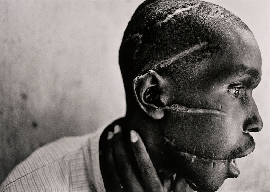
March 07, 2011

Like any art form, journalism has genres. There is the celebrity-fall-from-grace genre. There is the up-and-coming cable-television-pundit-zings-opposing-network-pundit genre. The scientists-discover-new-gene genre is controversial. Recent genetic research concerns a socially significant stereotype, that of the black male thug.
The gene is called monoamine oxidase A, or MAOA. It produces an enzyme that breaks down neurotransmitters which activate many of the brain’s circuits. Back in the 1990s, scientists discovered a mutation of MAOA that completely switches off the activation. The result is called Brunner syndrome, which is only known to have afflicted 14 men, all of them related.1. What makes this extremely rare mutation so important is that it links MAOA to violence and criminality. A man with Brunner syndrome is what psychiatrists refer to as “a bad guy.” Five of these 14 men were arsonists; others were rapists or attempted killers. Four men with the mutation somehow escaped having the syndrome, but 10 out of 14 is still significant.
Then came a flood of follow-up research, and MAOA was relabeled the “warrior gene.” A pair of 2008 studies found that a certain type of MAOA (2-repeat allele) doubles a person’s rate of violence (without factoring child abuse into the equation). This allele is less powerful than Brunner syndrome but far more common.
Three studies over the past five years hint that the especially dangerous 2-repeat allele might be more common among African Americans. In one study, 6% of nonwhite subjects had this allele.2 In another, five of 37 (14%) African-American men possessed these rare MAOA alleles.3 Those percentages are remarkable given that in both studies, fewer than one percent of white men had this gene. A third study determined that 0.5% of white MAOA genes and 4.7% of African-American MAOA genes feature this 2-repeat allele”almost a tenfold difference.4
If a single gene could offer some explanation as to why African-Americans commit roughly five times as many violent crimes per capita as whites, wouldn”t studying it”and how to treat it”potentially save countless lives and deserve a Nobel Prize?
A small number of genes such as MAOA greatly influence societal problems. However, some studies suggest that genetically determined behavior is spread diffusely among many genes. For society’s sake, science needs to examine the complex web of gene-environment, gene-hormone, and gene-gene interactions.
Consider a 2010 study5 that researched African-American men and five violence genes, concluding that a crude genetic index of these genes predicted adult violence and criminality more accurately than a detailed measure of the men’s childhood relationships with their mothers.
This line of research could reinforce unfair judgments that all black men are dangerous, but most black men do not have said allele; they merely have it at a rate ten times higher than white men do. If it is an important violence gene, maybe we can develop targeted treatments more likely to help African-American men and bring American society closer to equality. The eugenics era ended due to its disregard for moral responsibility. Let’s hope the coming genetics era is more mature and realistic.
Footnotes:
1. Brunner HG, Nelen MR, van Zandvoort P, Abeling NGGM, van Gennip AH, Wolters EC, Kuiper MA, Ropers HH, van Oost BA. “X-linked borderline mental retardation with prominent behavioral disturbance: phenotype, genetic localization, and evidence for disturbed monoamine metabolism.” American Journal of Human Genetics. 52: 1032-1039, 1993.
2. Widom CS, Brzustowicz LM. “MAOA and the “cycle of violence:” childhood abuse and neglect, MAOA genotype, and risk for violent and antisocial behavior.” Biological Psychiatry. 60: 684-689, 2006.
3. Rosenberg S, Templeton AR, Feigin PD, Lancet D, Beckmann JS, Selig S, Hamer DH, Skorecki K. “The association of DNA sequence variation at the MAOA genetic locus with quantitative behavioural traits in normal males.” Human Genetics. 120: 447-459, 2006.
4. Reti IM, Xu JZ, Yanofski J, McKibben J, Uhart M, Cheng Y, Zandi P, Bienvenu OJ, Samuels J, Willour V, Kasch-Semenza L, Costa P, Bandeen-Roche K, Eaton WW, Nestadt G. “Monoamine oxidase A regulates antisocial personality in whites with no history of physical abuse.” Comprehensive Psychiatry. 52: 188-194, 2011.
5. Beaver KM, Sak A, Vaske J, Nilsson J. “Genetic risk, parent-child relations, and antisocial phenotypes in a sample of African-American males.” Psychiatry Research. 175: 160-164, 2010.